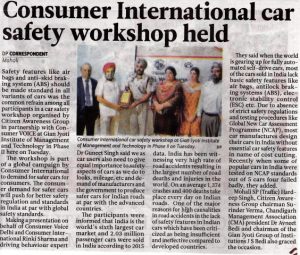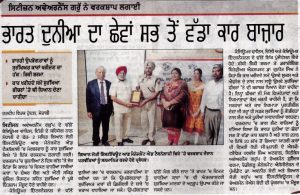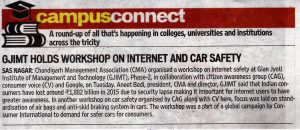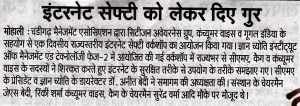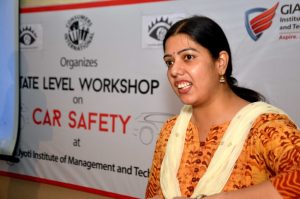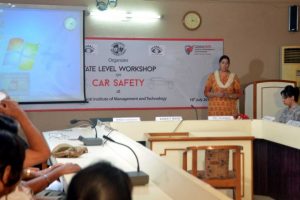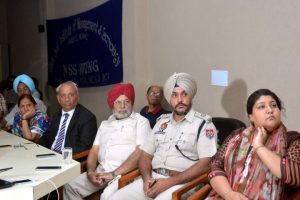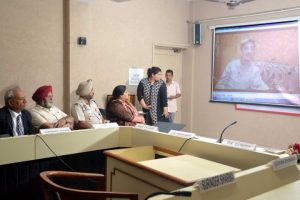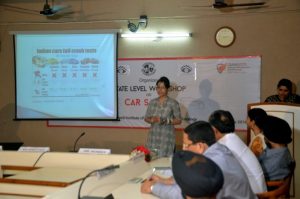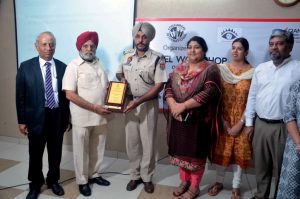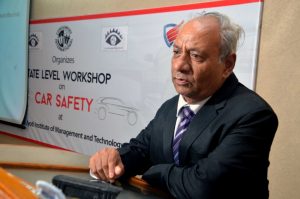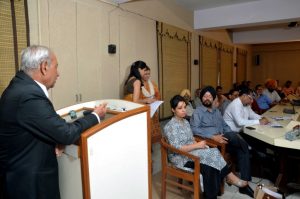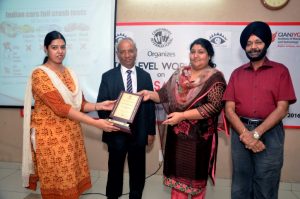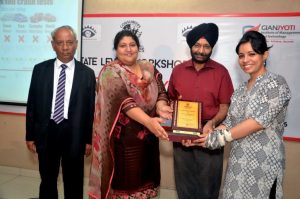Category Archives: MEDIA
Car Safety organised at Gyan Jyoti Institute of Management and Technology, Mohali on July 19, 2016.
Indian consumers deserve safer cars – Demand raised during Consumer International car safety workshop
Mohali, July 19, 2016 : Safety features like air bags and anti skid braking system (ABS) should be made standard in all variants of cars was the common refrain among all participants in a car safety workshop organised by Citizen Awareness Group in partnership with Consumer VOICE at Gian Jyoti Institute of Management and Technology in Phase II here on Tuesday.
The workshop is part of a global campaign by Consumer International to demand for safer cars for consumers. The consumer demand for safer cars will push for better safety regulation and standards in India at par with global safety standards.
Making a presentation on behalf of Consumer Voice Delhi and Consumer International Ms Rinki Sharma and driving behaviour expert Dr Guneet Singh said we as car users also need to give equal importance to safety aspects of cars as we do to looks, mileage, etc and demand of manufacturers and the government to produce safer cars for Indian roads at par with the advanced countries.
The participants were informed that India is the world’s sixth largest car market and 2.03 million passenger cars were sold in India as per 2015 data. India has been witnessing very high rate of road accidents resulting in the largest number of road deaths and injuries in the world. On an average 1,374 crashes and 400 deaths take place every day on Indian roads. One of the major reasons for high causalities in road accidents in the lack of safety features in Indian cars which have been criticized as being insufficient and ineffective compared to developed countries.
They said when the world is gearing up for fully automated self drive cars, most of the cars sold in India lack basic safety features like air bags, antilock braking systems (ABS), electronic stability control (ESC) etc. Due to absence of strict safety regulations and testing procedures like Global New Car Assessment Programme (NCAP), most car manufactures design their cars in India without essential car safety features in name of cost cutting. Recently when some of popular cars in India were tested on NCAP standards out of 5 cars four failed badly, they added.
Mohali SP (Traffic) Hardeep Singh, Citizen Awareness Group chairman Surinder Verma, Chandigarh Management Association (CMA) president Dr Avneet Bedi and chairman of the Gian Jyoti Group of Institutions J S Bedi also graced the occasion.
91% people in Chandigarh don’t consider protection from germs and illness as the main purpose for bathing: BaTh Survey
Beauty enhancement, fragrance and removing visible dirt rank much above protection from germs and illness as primary concern while buying bath product
22 April’14, Chandigarh: With the rising pollution and unhygienic environment conditions, today people across the country are at a higher risk of contracting infections and diseases. In order to identify how bathing practices across the country are helping people stay safe from the outside environment, the National Integrated Medical Association (NIMA) has initiated a series of surveys across cities in India.
The first phase of the survey was conducted in Chandigarh, Ahmedabad and Lucknow. Today, we are happy to share the key findings of this survey with you.
The second in the series will be conducted in Mumbai and Pune. This will be followed by surveys across the length and breadth of the country in the coming months. To study bathing habits, 300 married people with children in the age group of 8 – 14 years were selected randomly. The total population studied was 600. The study was conducted through two modes – (i) face to face, and (ii) online. Overall This first-of-its-kind survey aims to identify the bathing practices followed by people
across the country to keep them protected from the health risks from outside environment. The survey showed that for a city that faces very hot summers, significant 14% individuals do not take a bath daily.
Dr. Ashok Sharma, General Secretary, NIMA (North India branch), said, “According to the study, those who took bath in the night before retiring for the day constituted 26%. This again is significant, as these people carry with them the heat, sweat and grime of the previous night throughout the ensuing day before taking a shower in the evening (and probably getting back to bed soon) – hardly a healthy
trend!- occasionally as compared to the ones who are not.”
Key finding
The study showed that a miniscule 4% of the sample population took bath with antibacterial soap as compared to 91% respondents who bathe with beauty soaps. This key finding showed that the purpose of bathing – killing bacteria that could affect personal hygiene – was lost in most cases (as only 4% used anti-bacterial soap). So, most people are either unaware of or care little about the health-related aspects of taking a bath.
Bathing and falling sick: The connect Dr. RP Gaba, President, NIMA (Chandigarh branch), “A very interesting statistic thrown up by the survey is that only 12% of the daily bathers using anti-bacterial soap fall sick every month. This compares with a steep 55% who use other types of soaps, such as beauty soaps. It is evident that if one needs to stay protected from the health risk posed by outside environment, a beauty soap will not provide much assistance.”This finding of the connect between taking a bath with anti-bacterial soap and the frequency of falling sick highlights the importance of bathing with the right product(s).
Other factors
That’s not all. A mere 7% of the people polled said protection from germs and illnesses was the factor that decided the bathing product they used. And while 9% said they took a bath to protect themselves from germs and infections, 39% bathe to remove the visible dirt from their body.
Pollution and health
The study showed that in Chandigarh, 87% of those polled are exposed to the outside environment for 6 hours or more. As a result 69% of those who do not take a bath daily are reported to contract ailments such as flu, fever, diarrhoea or eye infections, at least once every month.
Other gems
Besides these numbers, the survey threw up other interesting insights. First, with the rising levels of environmental pollution in India, risks to health are also on the rise. Two, environmental pollution is generally associated with respiratory problems. And three, according to experts, environmental pollution is one of the biggest causes of skin, eye and enteric infections.
Conclusion
The survey has thrown up an undisputable chain — that bathing practices have a vital link with people’s health. As compared to the high exposure to outside environment, which leads to frequent bouts of sickness, practices such as frequency of bathing and preferred bathing products are still way below satisfactory levels. The result of the negative impact it has made on their health is evident.
